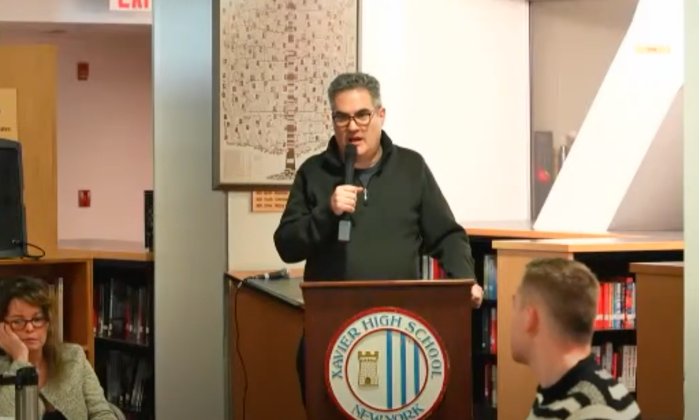Fans of Midtown’s Donnell Library, still feeling the loss of one of the most popular branches of the New York Public Library more than a year after it closed, are continuing to explore possible ways to preserve to the W. 53rd St. location despite the site’s sale to a hotel developer.
Donnell advocates and members of Community Board 5 took up the issue at a meeting of the board’s Landmarks Committee on Tues., Dec. 1, discussing how to at least save the structure in lieu of actually resurrecting its services.
Despite the admonition of committee chairperson Howard Mendes that the conversation focus on the merits of the Donnell building as a candidate for landmark designation, emotions about the library’s place in the community and its abrupt demise ran high. The committee was evenly split between pragmatists and sentimentalists, between the largely older members who had personal memories of the library and the mostly younger ones who did not.
“We were robbed,” said RitaSue Siegel, who has helped spearhead a campaign to restore at least some of the library’s functions, in characterizing the NYPL’s decision to close Donnell in November 2007. The move also forced the branch to severely trim each of its unique collections in order to place some in storage and relocate others to various temporary, smaller locations around the city. In accordance with the NYPL’s new policy to raise money by selling high-value properties, Donnell was sold for $59 million to Orient-Express Hotels, which plans to build an 11-story hotel on the site.
At the meeting, the realists who recognized the impossibility of restoring the library or believed the building’s architectural value didn’t merit preservation won the day with the aid of a member of the opposition.
Joyce Matz, a committee member and advocate for the library, cast the deciding vote against recommending the mid-20th-century, modernist building for landmark designation. Matz wanted a public hearing to give people an opportunity to voice their opinions about the closing of the library and the desirability of saving the building. It’s not a good idea, she said, to recommend designation now without a public hearing. “The Landmarks Commission will ignore us,” she stated. The committee’s vote effectively killed any further attempt to revive the library through landmarking.
“We have to be very careful about using the landmark process to stop development,” warned committee vice chairperson Ed Klimerman, who led the anti-landmarking push. “I could not in good faith even remotely consider this as a landmark. This whole thing has nothing to do with the building itself.” Klimerman said he thinks that when a building is landmarked for a reason other than its architectural significance, the process becomes “diluted—a terrible precedent that should never happen.”
Others seemed to agree. “I really think we’re all shooting ourselves in the foot by moving to designation when what we want is a library,” said board member Meile Rockefeller. Landmark status has no bearing on the structure’s future use, she said, so “we’re left with a hideous building,” and no library.
Committee member Curtice Taylor defended the “quirky mid-century building” as “a rather marvelous one” in part because of its low height that opens to the sky. Klimerman said that even if the building were to be preserved, “they would build a tower on top of it.”
Mendes had prepared a resolution outlining the historical, cultural and architectural significance of the building in support of a bid for landmark designation. Built in 1955, the Donnell was one of the NYPL’s most heavily used branches. Its World Languages Collection became indispensable for immigrants, and teenagers enjoyed many programs tailored for their tastes in the vast Teen Central section. The auditorium was used for concerts and other events.
The most eloquent defense of Donnell came from James Stuart, a member of the audience. “I believe it’s time to come to our senses and stay the hand that would eventually extinguish the cultural integrity of our unique city,” he said. “In the name of revenue, tourism and outright speculation, rapacious developers have been given a free hand to corrode the cultural and physical landscape of our city. A Disneyfication, a mall mentality is taking place when a major branch of the New York Public Library can be shut down in order to build yet another luxury hotel. It will not be long before this once-cultural bastion will become morally and aesthetically bankrupt, and will take on the complexion of any number of mediocre places that could never boast New York’s greatness.”































